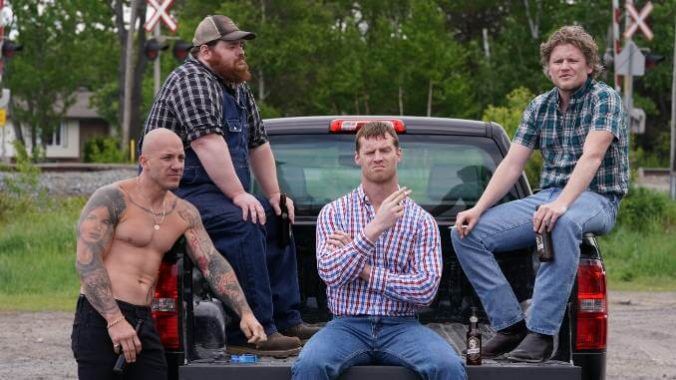
The eleventh season of Letterkenny, the Canadian sitcom that celebrates rural life, dropped on Hulu last month, and it does not disappoint. The gang is together again, talking, drinking, smoking, and fighting. The show has been widely popular in Canada since it premiered in 2016, but in the U.S., it has been a cult classic until only recently. It’s a shame, really, because Letterkenny might just be the most complex, smart, and hilarious sitcom kicking around today.
Episodes begin with a shot of pastoral life overlaid by text reminiscent of Dragnet and Law and Order: “There are 5,000 people in Letterkenny. These are their problems.” For such a small town, problems run rampant, often involving clashes between the town’s high school-like cliques: the hicks (farmers), the skids (drug dealers and users), the Christians, and the hockey players (vapid men whose only passions are hockey, weight lifting, and women). The show centers on a group of hicks — Wayne, his sister Katy, and his friends Daryl and Squirrelly Dan — but this being a small town, paths cross even when our heroes are simply minding the produce stand at the top of Wayne’s driveway.
Letterkenny’s creator and star, Jaren Keeso, credits Canada’s other great sitcom Trailer Park Boys as his inspiration, but Letterkenny is bigger than that: it is a deft pastiche of almost every sitcom genre. Like Seinfeld, Letterkenny pushes the limits of what a sitcom can do and say. It is a show about nothing; conversations revolve around trivialities that somehow feel bigger and more important than they should be. Over the years, the gang has discussed the intelligence of babies, people from LA, the appropriate distance men should stand at a urinal, cooking a steak, people who pretend to know everything (”everyone’s an expert”), and the complicated majesty of Canadian geese. Like Seinfeld, Letterkenny excels when it focuses on the mundane.
But Letterkenny is on Hulu and has the freedom to revel in vulgarities. Sex is on everyone’s mind, and running gags range from the puerile — a Mennonite family who constantly make dick jokes without realizing it — to the group’s fascination with a mutual acquaintance who sodomized an ostrich, “allegedly.” Often, conversations transform into extensive lists of slang terms; my favorite is when the group rattles off 15 different names for a penis. The lack of inhibition regarding bodily functions rivals that of any toddler — Squirrelly Dan’s announcement that “I’m about to give birth to a pound of fudge” will always have a place in my heart as does everyone’s lust for the town beauty, Bonnie McMurray. Bestiality, bodily functions, sex, drinking, cursing, it’s all there.
Despite its many vulgarities, Letterkenny does not hit with the same in-your-face grossness of It’s Always Sunny in Philadelphia thanks to its writers, whose scripts are brimming with complex wordplay. Conversations are conducted rapid-fire, sentences are full of slang, and everyone speaks with a unique patter. The show boasts a series of catchphrases — “sort yourself out;” “pitter patter, let’s get at ‘er;” and “that’s a big ten four old buddy” — which, anywhere else, would have quickly hollowed out. Above all, the insults of Letterkenny are nothing short of art; everyone takes each other down with elegance. When hockey players taunt their teammates, their quips amount to one-sentence stories: “I made your mom so wet Trudeau had to deploy a 24 hour national guard unit to stack sandbags around my bed.” And even the briefest of insults are alarmingly complicated. Wayne’s oft-quoted dig, “You’re made of spare parts, aren’t you bud?” is a show stopper. More to the point, no one in Letterkenny is safe; even Wayne and company go after each other with lightning speed. All of this makes it hard to turn away — no matter how gross things get.
The language of Letterkenny is groundbreaking, but the sitcom pushes the genre even further. Instead of reveling in the depravity of mankind, the show is invested in characters who are, simply put, good people. They are loyal friends and family, racially unbiased, quick to defend each other, and plots often center around righting wrongs. In this sense, Letterkenny owes as much to Seinfeld and It’s Always Sunny as it does to traditional sitcoms that traffic in family, friends, neighborliness, civility, and morality. Perhaps worried that its values were unclear, Letterkenny used two episodes in Season 8 to argue that even the most dated comedies with their feel-good plotlines, catchphrases, and one-dimensional characters have value.
It is Letterkenny’s embrace of multiple sitcom genres that allows it to stretch beyond family, friends, and community to earnestly consider the changing world. Much like All in the Family, Letterkenny uses its platform to explore societal issues: the dangers of stereotypes, misogyny, slut shaming, and racism; social media’s threat to privacy; toxic masculinity; and sexual identity. All in the Family avoided preachy morality by focusing on Archie Bunker, a buffoonish bigot and racist, whose antics drove audiences to laughter. Letterkenny chooses a different route, one which traffics in the hilarity of contrasts: a childish dick joke or insult, delivered with pithy intricacy, as everyone rides off in the back of Wayne’s pick-up truck to defend the honor of a friend.
And, within that contrast between the puerile, the elegant, and the valiant, Letterkenny shines.
Malkah Bressler is an entertainment writer who can recite the entire 2000 Year Old Man TV special from memory. You can find her on Twitter @malkstahb.